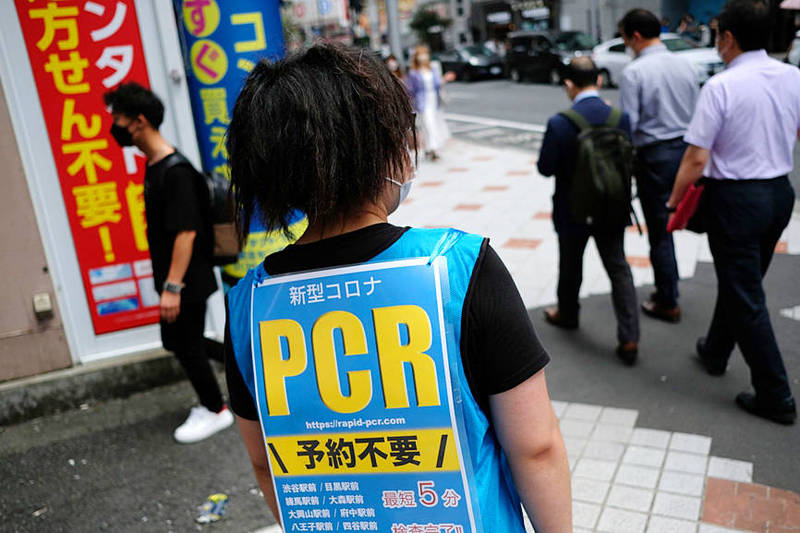《TAIPEI TIMES》 No more PCR tests required for foreign travelers: CECC

A worker wearing a vest advertising COVID-19 polymerase chain reaction tests stands on a street in Tokyo on Saturday. Photo: Bloomberg
By Lee I-chia / Staff reporter
Starting on Monday, international travelers to Taiwan will no longer be required to provide a negative COVID-19 polymerase chain reaction (PCR) test taken 48 hours before departure, the Central Epidemic Command Center (CECC) announced yesterday.
Following the removal of the test requirement for inbound Taiwanese travelers on July 14, the policy is to be extended to “all arriving travelers,” said Deputy Minister of Health and Welfare Victor Wang (王必勝), who heads the center.
“We want to remind travelers to Taiwan that they are still required to comply with other COVID-19 regulations,” he said, adding that the policy was made for their convenience.
PCR tests have become harder to find in some countries, and some passengers might need to make several transfers and find it difficult to obtain a negative result from a test taken 48 hours prior to the fight to Taiwan, he said.
Inbound travelers are still required to take a saliva-based PCR test when they arrive at the airport, and they also need to follow the “3+4” quarantine policy, he said, adding that these measures still serve as a first line of defense at the nation’s borders.
The policy refers to three days of home isolation and four days of self-disease prevention.
People who have tested positive in another country in the past seven days should not board a flight to prevent the virus from spreading across national borders, the CECC said.
Centers for Disease Control (CDC) Director-General Chou Jih-haw (周志浩), head of the CECC’s disease surveillance division, yesterday reported 23,655 new local cases, 143 imported cases and 25 deaths.
CDC Deputy Director-General Philip Lo (羅一鈞), deputy head of the CECC’s medical response division, said 85 moderate-to-severe cases were confirmed, including a severe case of a one-year-old boy, who developed a fever and a cough, and had difficulty breathing.
The boy was hospitalized for pneumonia, croup and respiratory distress. He received emergency treatment and has been moved from an intensive care unit to a general hospital room, Lo said.
Among 156 severe COVID-19 cases reported so far, 137 were unvaccinated, he said.
Of the 88 children who were diagnosed with multisystem inflammation syndrome in children, 73 were unvaccinated, Lo said, adding that the center encourages parents to get their child vaccinated to prevent severe illness.
Wang said the Food and Drug Administration on Tuesday received samples of the Pfizer-BioNTech COVID-19 vaccine for use in children aged six months through four years and can start conducting tests.
However, the company has not confirmed shipment dates as it is dealing with some quality management issues, he added.
As the Pfizer-BioNTech vaccine for young children is administered as a primary series of three doses, Wang said they may have to wait until December at the earliest to get full protection from the three doses.
As such, the CECC advises parents to have their children vaccinated with the Moderna COVID-19 vaccine as soon as possible, he said.
The center also advises unvaccinated people to get inoculated as it expects a wave of local infections from the Omicron subvariant BA.5 of SARS-CoV-2 between the middle and late this month, he said.
People are advised to continue taking personal preventive measures, and prepare preventive equipment earlier, such as masks and rapid test kits, he said.
People who have recently been exposed to confirmed cases should prevent direct contact with vulnerable groups — including elderly people, children and people with underlying health conditions — and get tested if they think they might have been infected, Wang added.
新聞來源:TAIPEI TIMES


















